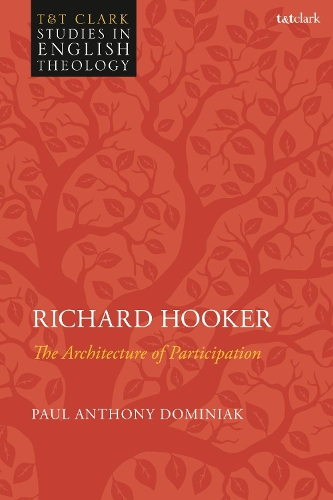
Richard Hooker: The Architecture of Participation
(Paperback)
Available Formats
Publishing Details
Richard Hooker: The Architecture of Participation
By (Author) Revered Dr. Paul Anthony Dominiak
Bloomsbury Publishing PLC
T.& T.Clark Ltd
17th June 2021
United Kingdom
Classifications
Tertiary Education
Non Fiction
Theology
262.983
Physical Properties
Paperback
240
Width 154mm, Height 232mm, Spine 16mm
380g
Description
Richard Hookers Of the Laws of Ecclesiastical Polity has long been acknowledged as an influential philosophical, theological and literary text. While scholars have commonly noted the presence of participatory language in selected passages of Hookers Laws, Paul Anthony Dominiak is the first to trace how participation lends a sense of system and coherency across the whole work. Dominiak analyses how Hooker uses an architectural framework of participation in God to build a cohesive vision of the Elizabethan Church as the most fitting way to reconcile and lead English believers to the shared participation of God. First exploring Hookers metaphysical architecture of participation in his accounts of law and the sacraments, Dominiak then traces how this architecture structures cognitive participation in God, as well as Hookers political vision of the Church and Commonwealth. The volume culminates with a summary of how Hooker provides a salutary resource for modern ecumenical dialogue and contemporary political retrievals of participation.
Reviews
Paul Dominiaks monograph on Richard Hookers metaphysics of participation is an outstanding research achievement. Opening with a discussion of the sapiential theology which inspires Hookers generic disposition of the species of law in the first book Of the Lawes of Ecclesiasticall Politie (1593), Dominiak argues that the work is constructed in accordance with a rigorously architectonic logic [} Dominiaks approach is radical in that he seeks to penetrate the underlying Neoplatonic metaphysical assumptions of this early-modern English philosophical theologian, and to show how these assumptions animate the treatise as a whole. [] This is an undeniably bold thesis, and the author demonstrates his claim with admirable lucidity and panache. * Torrance Kirby, McGill University, Canada *
The past half century has seen a remarkable flowing of attention to the theme of participation of sharing, or having from in Christian theology. In that, Richard Hooker has too often received only an honourable mention in passing. With The Architecture of Participation, Paul Dominiak lays out the participatory structure of Hookers thought with admirable clarity. All future writers on this central theme in Christian doctrine, metaphysics, and practice will be in Dominiaks debt. * Andrew Davison, Starbridge Lecturer in Theology and Natural Sciences, University of Cambridge, UK *
The study by Dominiak will greatly enhance the experience of reading Hookers Laws and, still further, will contribute to the self-understanding of those who lay claim to that tome of Elizabethan divinity. * Reading Religion *
Author Bio
Paul Anthony Dominiak is Vice Principal of Westcott House and an Affiliated Lecturer in the University of Cambridge, UK
